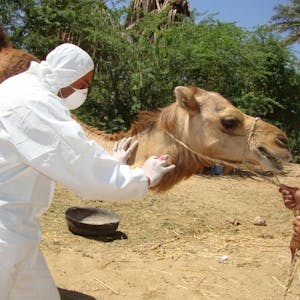Global Health at the Human-Animal-Ecosystem Interface
The University of Geneva, Institute Pasteur, University of Montreal and Centre Virchow-Villermé/University Paris Descartes welcome you to this MOOC on “Global Health at the Human-Animal-Ecosystem Interface”!Over the next 8 weeks, you will explore and learn about some of the major and current Global Health Challenges at the Human-Animal-Ecosystem Interface: zoonotic emerging infections (e.g. Ebola, Nipah, MERS, Avian Influenza), antimicrobial resistance, neglected tropical diseases (e.g. rabies, leishmaniasis, zoonotic TB), snakebite and other human-animal conflicts etc. You will learn new concepts from the field of epidemiology, social anthropology, disease ecology, veterinary sciences, global health policy etc. and approaches such as One Health, Eco-Health and Planetary Health. Also, you will learn about innovative tools and frameworks used to study and tackle some of these Global Health challenges of the Sustainable Development Goals era.
This MOOC proposes you a dynamic, international and interdisciplinary programme based on the One Health approach (human-animal-environmental dimensions) and involving more than 30 top experts from more than 20 academic and research institutions and international organisations based in Geneva, Paris, Montreal and the world. Policy makers from the World Health Organisation, clinicians from the University Hospitals of Geneva, epidemiologists from Institut Pasteur etc. will share with you their knowledge and experiences all along this MOOC. Video-lectures have been filmed in different parts of the world and settings (from the field to the lab and office) and will be combined with the latest open readings and interactive activities in the discussion forum, video-conferences etc.
This MOOC keeps evolving and enriching actively over time and two new sections on “Health Benefits at the Human-Animal-Ecosystem Interface” and “Management of Ecosystems under Global Changes: Implication for Human Health” have been added in May 2018. This latter section was developed in close collaboration with experts from World Health Organisation and the Convention on Biological Diversity and is introduced by Dr. Tedros Adhanom Ghebreyesus, WHO Director-General.
The development of this MOOC was led by Dr. Rafael Ruiz de Castañeda, Dr. Isabelle Bolon and Prof. Antoine Flahault from the Institute of Global Health of the University of Geneva. The list of instructors is completed by Prof. Arnaud Fontanet (Institut Pasteur) and Prof. André Ravel (Faculty of Veterinary Medicine, University of Montreal).
Watch our teaser here and let’s get started!
https://youtu.be/WT7-cC21uLU?list=PLnZ
(with subtitles in French and in Chinese)
None
Syllabus
Syllabus - What you will learn from this course
Week 1
Welcome! Key information on the MOOC
Global Health at the Human-Animal-Ecosystem Interface: The Need for Intersectoral Approaches (Section 1)
Week 2
Emerging Infectious Diseases (Section 2)
Week 3
Antimicrobial Resistance & Zoonotic Foodborne Infectious Diseases (Section 3)
Week 4
Zoonotic Neglected Infectious Diseases (Section 4)
Week 5
Conflicts & Injuries (Section 5)
Innovation & Opportunities (Section 6)
Week 6
Health Benefits at the Human-Animal-Ecosystem Interface (Section 7)
Week 7
Management of Ecosystems under Global Changes: Implications for Human Health (section 8)
Week 8
Final Quiz
FAQ
When will I have access to the lectures and assignments?
Access to lectures and assignments depends on your type of enrollment. If you take a course in audit mode, you will be able to see most course materials for free. To access graded assignments and to earn a Certificate, you will need to purchase the Certificate experience, during or after your audit. If you don't see the audit option:
What will I get if I purchase the Certificate?
When you purchase a Certificate you get access to all course materials, including graded assignments. Upon completing the course, your electronic Certificate will be added to your Accomplishments page - from there, you can print your Certificate or add it to your LinkedIn profile. If you only want to read and view the course content, you can audit the course for free.
Is financial aid available?
Yes. In select learning programs, you can apply for financial aid or a scholarship if you can’t afford the enrollment fee. If fin aid or scholarship is available for your learning program selection, you’ll find a link to apply on the description page.
Reviews
This course was very informative and interesting. All the instructors are highly knowledgeable and interesting. Enjoyed doing this course.
Very interesting course that covers a range of topics in terms of the linkage between human and animal health, as well as human and animal health and biodiversity loss.
The contents are informative in every possible ways as they cover numerous sectors. Instructors are spontaneous with excellent way of delivery. Overall this course is useful.
Fantastic! Made it easy to understand the complex issues. Inspirational too! Makes want to work for the UN.
